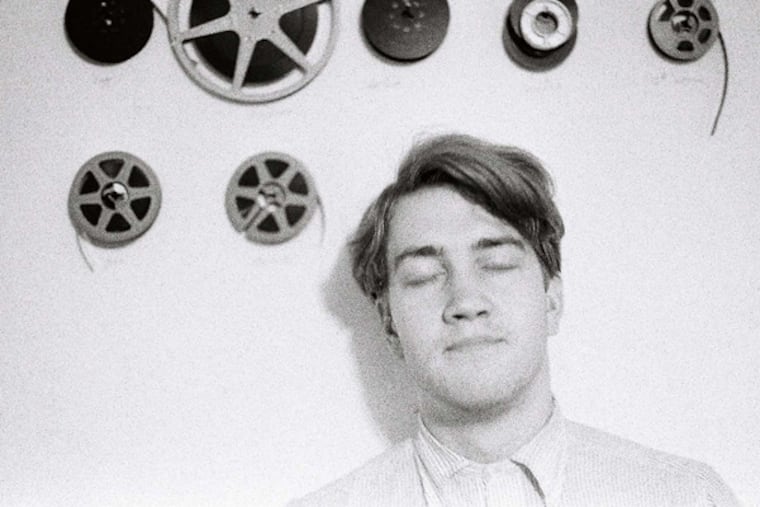Why Philly cares so much about David Lynch and why you should too
Don't understand why everyone is so excited about David Lynch? Let the Daily News tell you.

DAVID LYNCH is all over Philly right now. The director behind such cinema classics as "Blue Velvet," "The Elephant Man," "Eraserhead" and the landmark television series "Twin Peaks" is being honored by his alma mater, the Pennsylvania Academy of the Fine Art, with a four-month-long exhibit, and there are screenings happening all over the city.
While cinephiles know Lynch for his wonderfully weird and ambiguous screen work, and art-world fans know him for his visual work, not everyone is familiar with Lynch or why he's getting the full Philly treatment.
That's why the Daily News is here to help you out.
Why should Philly care about David Lynch?
Because without Philadelphia, there's no David Lynch.
"[Philadelphia] is more of a normal city now," Lynch said at a press conference yesterday at PAFA. "It wasn't normal when I was here."
From 1965 to 1970, Lynch lived and worked around 13th and Wood streets in an area now known affectionately as the Eraserhood, after "Eraserhead" (don't worry, we'll get to that).
All his work - from his films to his paintings and photographs - references "the fear, insanity, corruption, filth and despair in the air" that was our city in the late '60s.
But instead of disgust, Lynch relayed those memories with a certain affection, reiterating throughout the news conference that Philadelphia was the biggest influence of his much-lauded career.
Oh, yeah? So prove it.
Let PAFA do that for you.
"The Unified Field" displays works from throughout Lynch's artistic life, divided into themes that he carried from his time in Philadelphia - like a threat to the safety of domesticity and what happens to the body underneath that threat - to his travels beyond.
The works vary from prints to large paintings to film, namely "Six Men Getting Sick (Six Times)," a one-minute, looped film that opened the young artist up to the movies as a way to express himself.
"Something about absurdity and a surreal world was born in Philadelphia, Pennsylvania," Lynch said. If there's one way to see that statement writ large, go to the exhibit.
What else should we check out?
The Rodger LaPelle Gallery (122 N. 3rd St.), an Old City staple, is also showing Lynch's art pieces. He used to work with LaPelle when he was living in Philly.
When Lynch moved to Los Angeles in mid-1970, LaPelle would send him rolled-up pieces of paper and Lynch would send back a drawing, for which LaPelle paid $25.
"He really saved me," Lynch said of LaPelle.
LaPelle told me Lynch was the third artist he championed, behind Sydney Goodman ("one of the most acclaimed, influential, and respected artists Philadelphia has produced since the end of World War II," his Inquirer obit noted) and David Hockney (London's Daily Mail reported his net worth at 80 million pounds in 2011).
LaPelle noted Lynch's intensity, even as a student. "He had a spark," LaPelle said.
Now LaPelle's gallery sells prints of those pieces that "saved" Lynch on Amazon.com for $20.
What about those movies?
* I want the most Philly Lynch movie: Watch "Eraserhead," the 1977 midnight movie classic and Lynch's feature-length debut. It's a paranoid fantasia, with seemingly everything covered in the gritty, 1960s Philly soot that Lynch reminisced about.
* I want the mack daddy of Lynch movies: "Blue Velvet" it is. Starring Dennis Hopper, Kyle MacLachlan, Isabella Rossellini and frequent muse Laura Dern, "Blue Velvet" breaks down the seemingly normal exterior of the suburban experience to find something truly sinister underneath.
It's hard to get Hopper's Pabst Blue Ribbon-loving villain out of your head after the movie ends.
_ Um, how about something a little easier to digest? Lynch has that too! "The Elephant Man," about severely deformed John Merrick (John Hurt, nominated for an Oscar) and his relationship to his doctor, Frederick Treves (Anthony Hopkins).
Fun fact: The Academy Award for Best Makeup was created because of the work done in "Elephant Man."
There's also 1999's "The Straight Story," about an elderly World War II vet (Richard Farnsworth) who travels cross country on a lawnmower to make amends with his ailing brother (Harry Dean Stanton).
I'm more of a TV fan . . .
Even better.
"Twin Peaks," the surreal crime thriller starring MacLachlan as coffee-and-pie-loving Special Agent Dale Cooper, is a decidedly Lynchian creation.
Cooper is sent to the idyllic but ultimately super-weird Twin Peaks, Wash., to investigate the death of homecoming queen Laura Palmer.
Today, weird serial shows (think "Lost," "The X Files," "The Sopranos") are the norm rather than the exception, but "Twin Peaks" was revolutionary for its time. (Pro tip: Don't worry about watching season two, or the prequel movie, "Twin Peaks: Fire Walk with Me," until you're a devoted Lynch fan.)